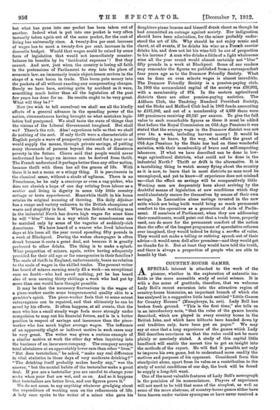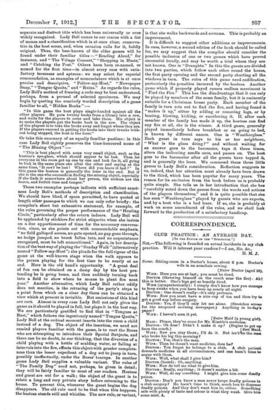COUNTRY-HOUSE GAMES.
ASPECIAL interest is attached to the work of the pioneer, whether in the exploration of antarctic ice- fields or the more accessible study of social science. It is with a due sense of gratitude, therefore, that we welcome Lady Bell's recent excursion into the attractive region of country-house bionomics, an important branch of which she has analysed in a suggestive little book entitled "Little Games for Country Houses" (Humphreys, is. net). Lady Bell has broken fresh ground. "This is the first time," she tells us in an introductory note, "that the rules of the games herein described, which are played in every country house in the British Isles, and which have hitherto been handed down by oral tradition only, have been put on paper." We may say at once that a long experience of the games which Lady Bell describes convinces us that the rules could not be more plainly or concisely stated. A study of this capital little handbook will enable the merest tiro to get an insight into the methods of the expert. He will find it possible not only to improve his own game, but to understand more readily the motives and purposes of his opponent. Considered from this standpoint alone, apart from its value as a contribution to the study of social conditions of our day, the book will be found to supply a long-felt want.
One of the most valuable features of Lady Bell's monograph is the precision of its nomenclature. Players of experience will not need to be told that some of the simplest, as well as some of the more abstruse, of country-house games either have been known under various synonyms or have never received a
separate and distinct title which has been universally or even widely recognized. Lady Bell comes to our rescue with a list of names and a classification which is at once clear, conserva- tive in the beat sense, and, when occasion calls for it, boldly Thus, the best-known of the older games will be found under their familiar titles —" Reading Aloud," for instance, and "The Village Concert," "Shopping in Haste," and "Catching the Post." Others have been re-named, or named for the first time—in almost every case with satis- factory terseness and aptness : we may select for especial commendation, as examples of nomenclature which is at once precise and descriptive, "Follow-my-Host," "Newspaper Snap," "Tongue Quoits," and "Ruins." As regards the rules, Lady Bell's method of framing a code may be best understood, perhaps, from a perusal of selected specimens. We may begin by quoting the concisely worded description of a game familiar to all, "Hidden Books "
"In this game the host plays single-banded against all the other players. He puts twenty books from a library into a row, and waits for the players to come and take them. His object is to make the players put the books back in the row. The object of the players is to take the books away and forget whose they are. If the players succeed in getting the books into their trunks with- out being stopped, the host is tha loser."
Or take this summary of an equally familiar pastime: in this case Lady Bell rightly preserves the time-honoured name of "The Missing Object " "This is best played with some very small object, such as the hostess's eye-glass, which should appear to be lost. Then let everyone in the room get up one by one and look for it, all going to look in the same place one after the other and saying at the same time, 'It can't be lost ! Where did you leave it last?' In this game the hostess is generally the loser in the end. But if she is the one who succeeds in finding the missing object, especially if she finds it somewhere about her person, the seekers are the losers, and forfeit time and temper."
These two examples perhaps indicate with sufficient exact-
ness Lady Bell's methods of description and classification. We should have liked, if space permitted, to have quoted at length other passages to which we can only refer briefly : the compiler's short but exhaustive statement, for example, of the rules governing the proper performance of the "Hunting Circle," particularly after the return indoors. Lady Bell will be applauded by sticklers for strict etiquette when she insists on a due apportionment of time for the necessary conversa- tion, since, as she points out with commendable emphasis, "no field galloped across, no gate opened, no gap gone through, no hedge jumped, no brook fallen into, and no acquaintance recognized, must be left unmentioned." Again, in her descrip- tion of the best way of playing the "Sunday Walk" (alternatively named "Follow-my-Host") she pleads for the full rigour of the game at the well-known stage when the walk appears to the person playing for the first time to be nearly at an end. Here is the old hand's opportunity. "A great deal of fun can be obtained on a damp day by the host pre- tending he is going home, and then suddenly turning back into a field to show where he means to plant firs next
year." Another alternative, which Lady Bell rather oddly does not mention, is the retracing of the party's steps to
a point from which on a clear day there can be obtained a view which at present is invisible. But omissions of this kind are rare. Almost in every case Lady Bell not only gives the game as it should be played in full, but plays it in the best way. We are particularly gratified to find that in "Tongues at Rest," which follows the ingeniously named" Tongue Quoits," Lady Bell at the critical moment inserts into the room a child instead of a dog. The object of the insertion, we need not remind players familiar with the game, is to rout the Bores who are attempting to introduce their Special Subjects, and there can be no doubt, to our thinking, that the diversion of a child playing with a kettle of scalding water, or falling at intervals into the fire, effects this object with greater complete-
ness than the lesser expedient of a dog set to jump in turn, possibly ineffectually, under the Bores' teacups. In another game Lady Bell supplies a valuable variant. The rules of "The Family Dog" need not, perhaps, be given in detail; they will be fairly familiar to most of our readers. Hostess and guest are out for a walk ; the object of the guest is to relate a long and very private story before returning to the house. To prevent this, whenever the guest begins the dog disappears. The old rule used to be that when this happens,
the hostess stands still and whistles. The new rule, or variant,
is that she walks backwards and screams. This is probably an improvement.
It is difficult to suggest other additions or improvements. In case, however, a second edition of the bcok should be called for, we may suggest that the compiler should consider the possible inclusion of one or two games which have proved successful locally, and may be worth a trial where they are not known. One is "Draughts." In this the guests are divided into two parties, which follow each other round the house, the first party opening and the second party shutting all the windows in turn. The rules of this game need codification, particularly the penalties incurred by the hostess. Another game which if properly played causes endless merriment is " Find the Fire." This has the disadvantage that it can only be played by members of the same family, but it is eminently suitable for a Christmas house party. Each member of the family in turn sets out to find the fire, and having found it "makes it up," either by adding or removing logs, or by beating, blowing, kicking, or smothering it. If, after each member of the family has made it up, the hostess can find any fire at all, she is the winner. A third game, generally played immediately before breakfast or on going to bed. is known by different names. One is "Weatherglass." Each guest in turn says to his or her neighbour, "What is the glass doing ? " and without waiting for an answer goes to the barometer, taps it three times, alters the indicating needle once, and passes on. The host goes to the barometer after all the guests have Lapped it, and is generally the loser. We commend these three little games to Lady Bell's consideration. Reflection suggests to us, indeed, that her attention must already have been drawn to the third, which has been popular for many years. The reason for its exclusion from the book before us is probably quite simple. She tells us in her introduction that she has "carefully noted down the games from the words and actions of the players themselves," and it is quite possible that she has seen " Weatherglass" played by guests who are experts, and by a host who is a bad loser. If so, she is probably at work on some amendment of the rules, and we shall look forward to the production of a satisfactory handicap.







































































 Previous page
Previous page